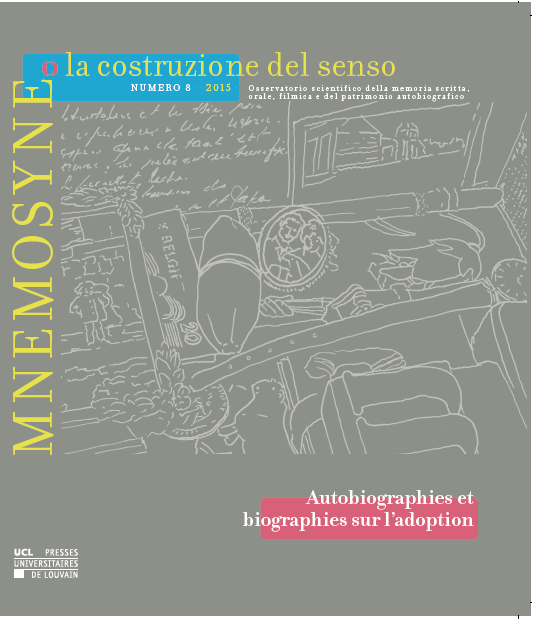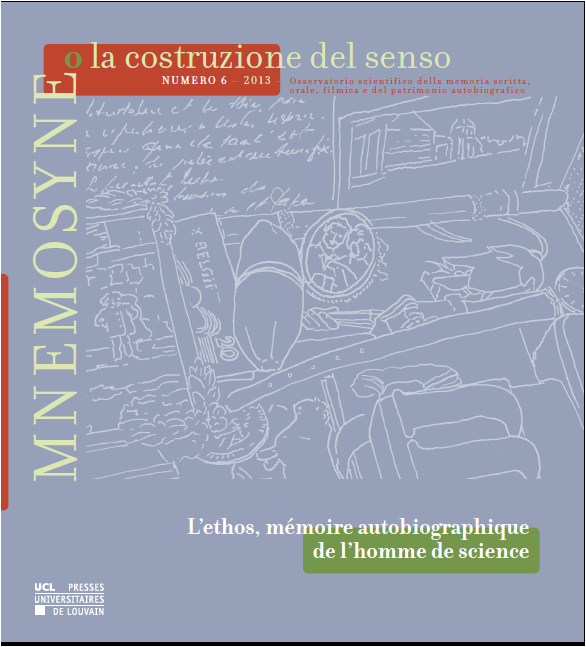Publications
Salon de la revue Paris 13-15 Octobre
Mnemosyne o la costruzione in Open access
18th International Meeting of the Scientific Observatory of Autobiographical Memory in Written, Oral and Iconographic Form
24, 25, 26 June 2019
organised by the cultural association Mediapolis.Europa
in collaboration with
Biblioteca di storia moderna e contemporanea BSMC
[Modern and Contemporary History Library]
Palazzo Mattei,
Via Michelangelo Caetani 32 - 00186 Roma
Autobiography : Banqueting, GM Food, Vampirism
Autobiography, Banqueting, GM Food, Vampirism is the theme of the 18th symposium of Mediapolis.europa 2019.
This call for papers invites proposals offering a detailed, well-documented and scientific analysis of the relationship between writing about oneself and materially and/or symbolically feeding oneself in written, oral and iconographical expressions.
The ritual of the meal has been a cultural cornerstone – in sumptuous contexts as much as in frugal ones, in life as in death. In the Day of the Dead, the individuality of the deceased is outlined by the kind of food and drink that they used to consume when they were alive.
Topoi and words specify the meaning of all this. Symposium, from syn: together, and posion: drink; banquet: a meal shared by several people; meal: eating; appetite: desire in general and for food in particular; Lucullan: elegance, hospitality. Locutions such as bread and circuses and countless proverbs give us the common meaning of precepts and behaviours.
In Signes de vie. Le pacte autobiographique 2, Philippe Lejeune evokes (from Plutarch) the description of a meal hosted by Lucullus, around which a wealth of anecdotes has developed due to the sophistication of his banquets. Pliny writes that the servants had set the table only for Lucullus, who said, scowling: did you not know that today Lucullus dines with Lucullus? (Ph. Lejeune, 2005: 215-227), demanding that the table be set for another, unreal person. Sitting at the table is implicitly an encounter with the other. Every meal is a relational act.
This basic function of the living has acquired a symbolic character since antiquity: from the myth of the apple of discord, through the banquets of Herod Antipas, through the various meals described in the Iliad, and onwards in time to the scene of Count Ugolino in Dante’s Divine Comedy, to whom Dante wanted to give voice through direct speech so that Ugolino becomes a witness of himself. In Boccaccio’s eponymous story, too, Federigo degli Alberighi is an expression of food as a symbolic value. Lacking adequate means of hospitality, Federigo sacrifices his falcon in order to offer a meal to Monna Giovanna, who had actually come to ask him for that bird of prey for her sick son.
In Le livre des merveilles, or The Travels of Marco Polo, Polo’s entire autobiographical narration (dictated to Rustichello da Pisa in prison in Genoa between 1295 and 1298, upon his return from his long journey to China and his stay with the Khan) is studded with the discovery of foods. Polo deliberately wants to arouse curiosity, having witnessed hitherto unknown habits and customs during his amazing journey. With his merchant’s eye, Marco Polo mentions many spices such as saffron, cloves, nutmeg, ginger – foodstuffs that were new to the West.
More generally, the discovery of food, its smells, its flavours, its look, and the exchange of food represent a binding agent, an object of fraternity or enmity.
At every time and in every culture, poverty has coined an imaginary idea around food. Especially with the discovery of the New World, eating has been seen as a dream that can come true in a fantastic Land of Plenty, with an idea of abundance as a projection of atavistic desires.
Two opposite views of the act of feeding in the construction of oneself date back to the 18th-19th centuries.
On the one hand, the vampire feeds on other people’s blood and allows the person whose blood is drawn to survive forever. In these narrations, the reporter of the occurrence is a third person who has gathered evidence, with the vampire remaining an instrument of revelation of somebody else’s personality. This gesture is destined to remain nocturnal because it lays bare the inclination to devour the other in the broad sense, which is present in man but is morally condemned.
In contrast, in Émile, Rousseau expresses the cheerful idea of the sunny open-air party, a moment of fulfilment of friendship and sociability, of dialogue between culture and nature.
In the episode concerning “the meal in Turin” in The Confessions, Rousseau uses nuances close to psychoanalysis to describe how over the course of a meal he highlighted the real meaning of the words in the coat of arms of the Solar family. He, the shy guest of a prestigious household, ends up making blunders due to the emotions stirred by his own actions.
Many autobiographical works discuss different aspects of this topic: otherness; the journey; war; lexicon (GM food, junk food, the Land of Plenty); pathologies; interculturality; death, and more.
A few reference texts on autobiography and food:
Jean-Claude BONNET, Le système de la cuisine et du repas chez Rousseau, «Poétique», 22, 1975, pp. 244-267.
May CHEHAB et Apostolos LAMPROPOULOS dir., AutoBioPhagies, Berne, Peter Lang (« Littératures de langue française », n. 18), 2011.
Daniele GRANATELLI, Il sapore del pane, Milano, Terre di mezzo, 2000.
Sabine JARROT, Le vampire dans la littérature du XIXe siècle. De l’Autre à un autre soi-même, Paris, L’Harmattan, 1999.
Franz KAFKA, Lettre au père, 1919.
Philippe LEJEUNE, “Lucullus dîne chez Lucullus”, in Signes de vie. Le pacte autobiographique 2, Paris, Seuil, 2005, pp. 215-227.
Giacomo LEOPARDI, Zibaldone, (1817 - 1832).
Marco POLO, Le livre des merveilles, 1295-1298.
Jean Jacques ROUSSEAU, Confessions, (1789) livre III, Bernard Gagnebin et Marcel Raymond (dir.), in id. Œuvres complètes, t. I, Paris, Pléiade, 1959, pp. 94-96.
Jean STAROBINSKI, « ‘Le déjeuner sur l’herbe’ et le pacte social », Studi Francesi, 167 (LVI | II) | 2012, 209-219. https://journals.openedition.org/studifrancesi/3929
Some more general references:
Karen BLIXEN, Le dîner de Babette, 1958.
Franco CARDINI, L' appetito dell'imperatore. Storie e sapori segreti della Storia, Milano, Bompiani, 2014.
Marcel DETIENNE, Jean-Pierre VERNANT, La Cuisine du sacrifice en pays grec, Paris, Gallimard, 1979.
Knut HAMSUN, La Faim, 1890.
Massimo MONTANARI, La fame e l’abbondanza, Bari, Laterza, 1993.
PETRONIUS, Satyricon, 54-68 après Jésus Christ.
Film: Marco FERRERI, La grande bouffe, 1973.
LANGUAGES ADMITTED FOR THE INTERVENTIONS: English, French, Italian, Spanish. Every speaker will speak in the chosen language; there will be no simultaneous translation. A rough passive understanding would be desirable.
ABSTRACT
A) The deadline for the submission of papers is 20 February 2019. Candidates are asked to present an abstract of up to 250 words, with citation of two reference texts, and a brief curriculum vitae of up to 100 words, with possible mention of two publications, be they articles or books. These must be submitted onlineon the conference registration page of the http://mediapoliseuropa.com/Website.
The scientific committee will read and select every proposal that will be sent to the conference registration page of the http://mediapoliseuropa.com/Website. For any information, please contact the following: This email address is being protected from spambots. You need JavaScript enabled to view it. , This email address is being protected from spambots. You need JavaScript enabled to view it. ,
B) Notification of the accepted proposals will be given by 28 February2019.
C) For information on registration fees, past symposia, the association’s activities, and the organising and scientific teams, please refer to our Website:
http://mediapoliseuropa.com/
The association Mediapolis.Europa contributes to the publication of the journal Mnemosyne, o la costruzionedel senso, Presses universitaires de Louvain, www.i6doc.com,
Indexed a scientific journal in :
https://dbh.nsd.uib.no/publiseringskanaler/erihplus/periodical/info?id=488665
Scientific Committee
Beatrice Barbalato, Mediapolis.Europa
Fabio Cismondi, Euro Fusion
Antonio Castillo Gómez, Universidad d’Alcalá de Henares (Madrid)
Irene Meliciani, Mediapolis.Europa
Albert Mingelgrün, Université Libre de Bruxelles
Giulia Pelillo-Hestermeyer, Universität Heidelberg
Anna Tylusińska-Kowalska, Uniwersytet Warszawski
Organisation
Irene Meliciani, Managing director Mediapolis.Europa
Partners
PAST EVENTS
- Mediapolis.Europa is happy to announce that mnemosyne o la costruzione del senso is now part of ERIH
- Mediapolis.Europa in radio fahrenheit
- Prof Beatrice Barbalato à France Culture La conversation scientifique
PAST EVENTS
- Mediapolis.Europa is happy to announce that mnemosyne o la costruzione del senso is now part of ERIH
- Mediapolis.Europa in radio fahrenheit
- Prof Beatrice Barbalato à France Culture La conversation scientifique








